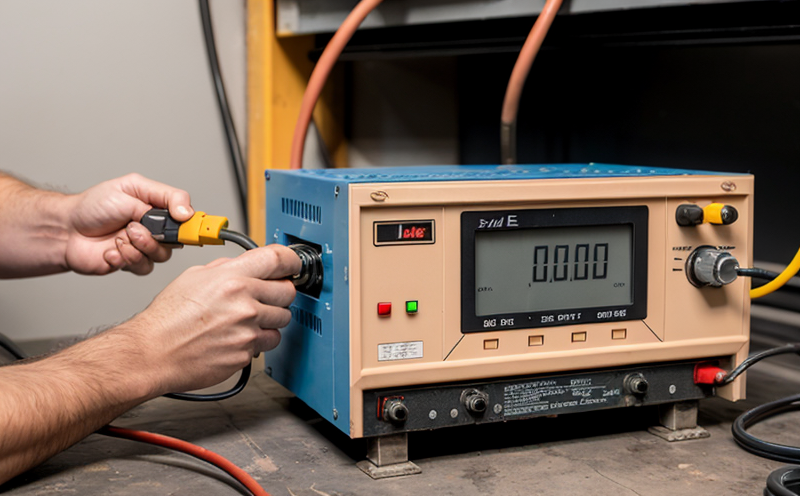IEC 60749-59 Die Hot Carrier Injection Testing
The IEC 60749-59 standard is a critical part of the semiconductor and microchip testing industry, providing detailed protocols for die-level electrical and functional testing. This service focuses specifically on Hot Carrier Injection (HCI) Testing, which is used to evaluate the reliability and performance of integrated circuits by simulating the effects of high-energy electrons in transistors.
The process involves applying a series of voltage stress levels to the die, causing hot carriers to inject into the oxide layer. This can lead to degradation or failure over time. By performing this test early in the manufacturing process, defects can be identified and addressed before they become costly issues during production runs. The IEC 60749-59 standard ensures that these tests are conducted with precision and repeatability.
The testing procedure is rigorous and involves complex steps to ensure accurate results. First, the die must undergo thorough cleaning and preparation to remove any contaminants that could affect test outcomes. Specialized equipment then applies controlled voltage stress levels to simulate real-world conditions experienced by the circuits during use. The performance of each die is monitored closely throughout the process.
The data collected from this testing can provide critical insights into potential failures due to hot carrier injection, allowing manufacturers to improve product design and quality control processes. This service not only adheres strictly to IEC 60749-59 but also leverages advanced instrumentation and software to deliver precise results.
Hot Carrier Injection Testing is essential for ensuring the reliability of modern semiconductor devices, particularly in high-performance applications such as automotive electronics, aerospace components, and telecommunications equipment. By identifying weak points early on, manufacturers can enhance product durability and meet stringent industry standards.
| Test Parameter | Specification |
|---|---|
| Temperature Range | -55°C to +125°C |
| Voltage Stress Levels | Up to 10V per test cycle |
| Test Duration | Multiple cycles over several hours |
| Data Collection | Continuous monitoring of electrical characteristics |
The results of this testing are crucial for quality assurance teams and compliance officers. By adhering to the IEC 60749-59 standard, we ensure that our clients receive reliable and accurate test data which can be used to make informed decisions about product design improvements.
For R&D engineers, this service offers valuable insights into how different materials or designs might perform under various stress conditions. This information is invaluable for innovating new products with enhanced reliability and longer lifespans. For procurement personnel, it provides confidence that the components they purchase meet stringent quality requirements before being integrated into larger systems.
In summary, IEC 60749-59 Die Hot Carrier Injection Testing plays a vital role in maintaining high standards of semiconductor manufacturing by identifying potential issues early on. This service is not just about meeting compliance; it's about delivering superior products that meet the highest expectations of performance and reliability.
Industry Applications
- Automotive electronics where durability under extreme conditions is crucial
- Aerospace components requiring long-term reliability in harsh environments
- Telcommunications equipment demanding consistent operation across diverse climates
- Consumer electronics ensuring long battery life and efficient power management
- Medical devices where precision and stability are paramount
The IEC 60749-59 standard is widely adopted in these sectors due to its rigorous approach to testing die-level components. The hot carrier injection simulation helps ensure that even the smallest component meets the stringent demands of these industries.
Environmental and Sustainability Contributions
- Reduces waste by identifying defects early in production
- Minimizes energy consumption through optimized design iterations
- Promotes resource efficiency by improving product durability
- Supports sustainable manufacturing practices by adhering to international standards
The IEC 60749-59 Die Hot Carrier Injection Testing service contributes positively towards environmental sustainability. By identifying and rectifying defects during the early stages of production, waste is minimized while energy consumption is reduced through more efficient design iterations. Additionally, durable products that last longer contribute to overall resource efficiency.
Competitive Advantage and Market Impact
The ability to conduct precise and reliable IEC 60749-59 Die Hot Carrier Injection Testing provides a significant competitive advantage in the semiconductor industry. Compliance with this standard ensures that products meet international quality benchmarks, thereby enhancing credibility among customers.
By offering this specialized testing service, our laboratory can help manufacturers achieve superior product performance and reliability. This not only improves customer satisfaction but also differentiates them from competitors who may lack similar capabilities. In an increasingly competitive market, being able to deliver high-quality products quickly becomes a key factor in maintaining and growing market share.
The use of advanced instrumentation and software ensures that every test adheres strictly to the IEC 60749-59 standard. This precision guarantees consistent results across multiple samples, which is crucial for quality assurance teams working with large-scale production lines. The insights gained from these tests can be used to drive continuous improvement initiatives within R&D departments, leading to innovations that further enhance product reliability and performance.
For procurement personnel, knowing that the components they purchase have undergone thorough testing according to this standard gives them peace of mind about meeting stringent quality requirements before integration into larger systems. This confidence in supply chain integrity supports overall business operations and helps maintain customer trust.





